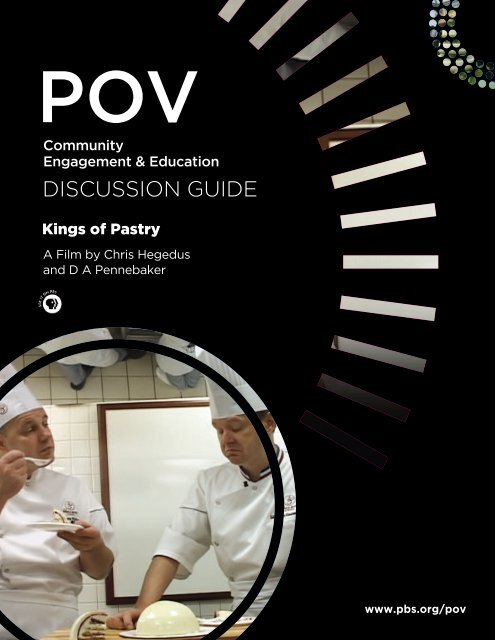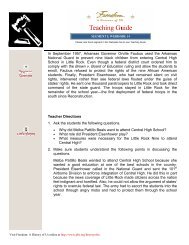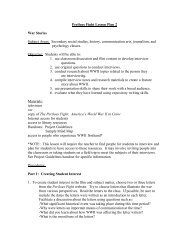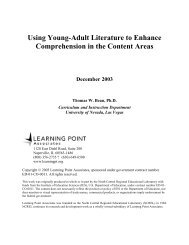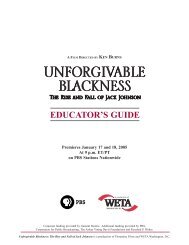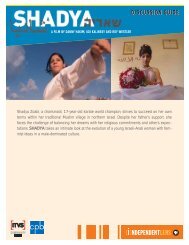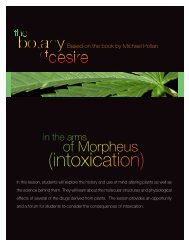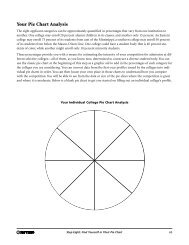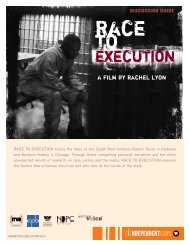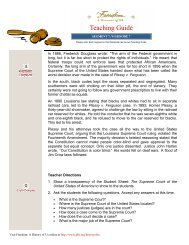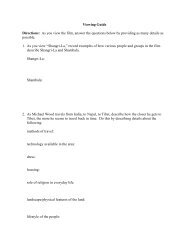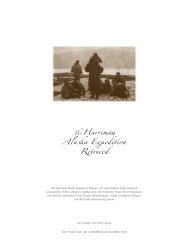DISCUSSION GUIDe - PBS
DISCUSSION GUIDe - PBS
DISCUSSION GUIDe - PBS
Create successful ePaper yourself
Turn your PDF publications into a flip-book with our unique Google optimized e-Paper software.
POV<br />
Community<br />
Engagement & Education<br />
Discussion GuiDe<br />
Kings of Pastry<br />
A Film by Chris Hegedus<br />
and D A Pennebaker<br />
www.pbs.org/pov
Background Letter from the information<br />
fiLmmakers<br />
PoV<br />
new YorK, 2011<br />
People often ask why we would make a<br />
film about a French pastry competition but<br />
as soon as we met chef Jacquy Pfeiffer it<br />
became clear that the Meilleurs ouvriers de<br />
France (MoF) competition was not going<br />
to be your average Top Chef cook off.<br />
These reality TV shows seemed like mere<br />
wind sprints compared to the marathon<br />
three-day MoF contest which he was<br />
preparing to enter. But winning is not all<br />
that this epic contest represents. Becoming<br />
a MoF (Best craftsman in France) is a<br />
lifelong dream for French artisans that can<br />
only come true by seeking excellence. As<br />
Jacquy would say, “The MoF is not about<br />
doing the ‘best that you can do’ but the<br />
'best that can be done'." This degree of<br />
perfection in the pastry profession, like<br />
most olympic contests, is achieved<br />
through passion, sacrifice, and extraordinary<br />
skill -- and as we found out, for<br />
Jacquy and the other fifteen finalists, a lot<br />
of luck.<br />
Filmmakers chris Hegedus (l.) and D A Pennebaker<br />
our filmmaking has allowed us to witness<br />
Photo courtesy of Kit Pennebaker<br />
many different worlds through the eyes of<br />
interesting and talented people, many of<br />
whom have become friends. chef Jacquy Pfeiffer is among them. what we found in the arcane creation of French pastry was<br />
a process based on ancient kitchen physics. once you have learned the laws that apply, perfection lies in the job of properly<br />
carrying them out. Most Americans hardly recognize the names of classic French pastries — macarons, dacquoise, brioche<br />
— some of the exquisite treats that Jacquy perfects daily. But what we did not expect was that Jacquy was more than a baker.<br />
He was an artist creating towering sugar sculptures, Brancusi style blown sugar figures, and large intricate Faberge eggs.<br />
everyday we watched Jacquy push himself toward excellence and show students at his chicago based French Pastry school<br />
what the MoF is all about.<br />
Fifteen extraordinary finalists competed with Jacquy in Lyon each pursuing their dream to wear the tri-color collar of a MoF<br />
and to enter the pastry elite. Many other renowned chefs lent their expertise as judges, tasters and helpers. watching the camaraderie<br />
between the chefs was inspirational and at times of crisis especially moving to witness. we are extremely grateful<br />
to the MoF organization for letting us be the first to film this fascinating world.<br />
Chris Hegedus and D A Pennebaker<br />
Filmmakers, Kings of Pastry<br />
<strong>DISCUSSION</strong> <strong>GUIDe</strong><br />
Kings of Pastry<br />
|2
Background taBLe of contents information<br />
credits<br />
PoV<br />
4 Introduction<br />
5 Potential Partners<br />
5 Key Issues<br />
5 Using This Guide<br />
6 Background Information<br />
6 Meilleurs Ouvriers de France (MOF)<br />
9 The Art and Science of French Pastry<br />
11 Sugar Sculpture<br />
12 The French Pastry School<br />
12 Career Education<br />
14 Selected People Featured<br />
in Kings of Pastry<br />
16 General Discussion Questions<br />
17 Discussion Prompts<br />
18 Taking Action<br />
19 Resources<br />
21 How to Buy the Film<br />
Writer<br />
Faith Rogow, PhD<br />
Insighters Educational Consulting<br />
Background Writers and editors<br />
Flora Lazar<br />
Kristine Wilton<br />
guide Producers, PoV<br />
eliza Licht<br />
Director,<br />
Community Engagement & Education, POV<br />
Jamie Dobie<br />
Coordinator,<br />
Community Engagement & Education, POV<br />
Design: Rafael Jiménez<br />
Copy editor: Natalie Danford<br />
thanks to those who reviewed this guide:<br />
Chris Hegedus and D A Pennebaker<br />
Directors, Kings of Pastry<br />
Flora Lazar<br />
Producer, Kings of Pastry<br />
<strong>DISCUSSION</strong> <strong>GUIDe</strong><br />
Kings of Pastry<br />
|3
introduction<br />
PoV<br />
kings of Pastry (84 mins.) is a unique documentary that<br />
captures the high stakes drama of the prestigious Meilleurs<br />
ouvriers de France (Best craftsmen in France) pastry competition.<br />
captured on film here for the first time, this threeday<br />
contest defines excellence. The 16 finalists exemplify<br />
passion, dedication, sacrifice, skill and artistry, sculpting<br />
everything from delicate chocolates to six-foot sugar sculptures<br />
in hopes of winning one of the coveted blue, white and<br />
red striped collars worn by France’s very best pastry chefs.<br />
The film follows chef Jacquy Pfeiffer, co-founder of<br />
chicago’s French Pastry school, and profiles two other finalists<br />
— chef régis Lazard, who is competing for the second<br />
time (he dropped his sugar sculpture the first time), and<br />
chef Jacquy Pfeiffer<br />
Photo courtesy of nick Doob<br />
chef Philippe rigollot from Maison Pic, France’s only threestar<br />
restaurant owned by a woman. The portrait of these<br />
men is as much of a treat as their delectable creations. we<br />
see them as fathers, husbands and professionals who display<br />
remarkable humility and respect for their fellow competitors.<br />
For them, the quest to become great clearly extends beyond<br />
the kitchen to permeate every aspect of their lives. kings of<br />
Pastry is a valuable outreach tool for anyone hoping to inspire<br />
people to do their best — in the kitchen, at work, in<br />
school or in life.<br />
<strong>DISCUSSION</strong> <strong>GUIDe</strong><br />
Kings of Pastry<br />
|4
Background PotentiaL Partners information<br />
key issues<br />
PoV<br />
kings of Pastry is well suited for use in a variety of settings<br />
and is especially recommended for use with:<br />
• your local PBs station<br />
• groups that have discussed previous PBs and PoV<br />
films related to competition and perseverance,<br />
such as Kokoyakyu: High School Baseball and<br />
Racing Dreams<br />
• groups focused on any of the issues listed in the<br />
key issues section<br />
• trade school and high school students, especially<br />
those enrolled in culinary education programs<br />
• middle school students involved in excellence<br />
initiatives<br />
• teachers and coaches focused on resilience<br />
• faith-based organizations and institutions<br />
• cultural, art and historical organizations,<br />
institutions and museums<br />
• community-based cooking classes<br />
• civic, fraternal and community groups<br />
kings of Pastry is an excellent tool for outreach and will<br />
be of special interest to people interested in the following<br />
topics:<br />
• achieving excellence<br />
• art<br />
• coaching<br />
• chefs<br />
• competition and cooperation<br />
• cooking<br />
• culinary arts<br />
• education<br />
• france<br />
• Pastry<br />
• Perseverance<br />
• resilience<br />
• setting standards for excellence<br />
• trades, training and apprenticeship<br />
• academic departments and student groups at<br />
colleges, universities and high schools<br />
• community organizations with a mission to<br />
promote education and learning, such as your<br />
local library<br />
using this guide<br />
This guide is an invitation to dialogue. it is based on a belief in the power of human connection, designed for people who<br />
want to use kings of Pastry to engage family, friends, classmates, colleagues and communities. in contrast to initiatives<br />
that foster debates in which participants try to convince others that they are right, this document envisions conversations<br />
undertaken in a spirit of openness in which people try to understand one another and expand their thinking by sharing<br />
viewpoints and listening actively.<br />
The discussion prompts are intentionally crafted to help a very wide range of audiences think more deeply about the issues<br />
in the film. rather than attempting to address them all, choose one or two that best meet your needs and interests.<br />
And be sure to leave time to consider taking action. Planning next steps can help people leave the room feeling energized<br />
and optimistic, even in instances when conversations have been difficult.<br />
For more detailed event planning and facilitation tips, visit www.pov.org/outreach<br />
<strong>DISCUSSION</strong> <strong>GUIDe</strong><br />
Kings of Pastry<br />
|5
Background information<br />
PoV<br />
meilleurs ouvriers de france (mof)<br />
The Meilleurs ouvriers de France was created nearly a century<br />
ago to help preserve the quality of French artisan trades<br />
and to affirm the importance of manual work in a society<br />
that has historically prized intellectuals. Participation in the<br />
competition is recognized throughout France as the official<br />
mark of the country’s most accomplished artisans.<br />
The first president of the MoF association, Georges castelain,<br />
outlined the group’s ethics and purpose in the following<br />
speech:<br />
Our organization should be an extended family where we are<br />
brothers and sisters from the same father — work — and the<br />
same mother — France. Just as real brothers and sisters would,<br />
we should help and protect one another always. Once a MOF,<br />
the story does not end here. The MOF must continue in their<br />
search for perfection to show that they are worthy of their<br />
title, to avoid getting stuck in a rut and to learn new techniques.<br />
Sometimes a MOF becomes a teacher, trans-<br />
chef Jacquy Pfeiffer sets up his buffet for the final MoF<br />
judging, while a MoF judge looks on in Lyons, France, 2007.<br />
Photo courtesy of D A Pennebaker<br />
mitting his trade and his savoir-faire to those who, one day<br />
perhaps, will follow his….. lead. They can train young talent,<br />
helping those they think capable of going a long way, search<br />
for possible candidates for future competitions, encouraging<br />
and advising them. Such is a MOF’s role in society.<br />
Today, the competition is held for people in more than 100<br />
different creative trade professions in France, from florist to<br />
carpenter to butcher to jeweler to pastry chef. competitions<br />
for the individual professions take place every three to four<br />
years, with the distinguished winners serving as ambassadors<br />
for their trade.<br />
kings of Pastry documents the MoF pâtissier, or pastry chef,<br />
competition in 2007. in this year of competition, finalists<br />
were chosen from 80 chefs who competed in semi-finals six<br />
months to a year before the final competition. The two-day<br />
<strong>DISCUSSION</strong> <strong>GUIDe</strong><br />
Kings of Pastry<br />
|6
Background information<br />
PoV<br />
semi-final round took place at culinary schools all around<br />
France and was similar to an audition, with a theme provided;<br />
16 chefs were chosen to move forward. often, semifinal<br />
and final themes are announced six months to a year<br />
before each round of competition, which means that a MoF<br />
candidate will have spent up to two years preparing and<br />
practicing for the final competition. There is no limit to how<br />
many of the 16 finalists can receive the MoF distinction.<br />
For the 2007 pâtissier final, the theme was “marriage,” and<br />
each competitor was tasked with creating a wedding buffet<br />
that included a wedding cake, a sweets table and a breakfast<br />
for the morning after. The required items, divided into taste<br />
and artistic components, included:<br />
chef regis Lazard works on a trial sugar sculpture as he<br />
prepares for the MoF competition in Lyons, France, 2007.<br />
Photo courtesy of chris Hegedus<br />
Taste components:<br />
• five types of miniature pâte à choux items (cream<br />
puffs, 12 pieces of each);<br />
• one three-tiered wedding cake to serve 30 people;<br />
• three types of chocolate candies (20 each);<br />
• one “restaurant style” (plated) dessert (four portions);<br />
• one brioche for two to be served with 1,500 grams of<br />
jam made with a summer fruit and associated with a<br />
flower;<br />
• three types of miniature afternoon tea creations (12<br />
each);<br />
• one surprise item made from a specific basket of<br />
ingredients that would be unveiled to the candidates<br />
on the first day of the competition.<br />
<strong>DISCUSSION</strong> <strong>GUIDe</strong><br />
Kings of Pastry<br />
|7
Background information<br />
PoV<br />
Artistic components:<br />
• one chocolate sculpture that would be<br />
used to display the chocolate candies;<br />
• one sugar showpiece that would serve as<br />
a centerpiece for the buffet;<br />
• one small masterpiece, called a bijou, or<br />
jewel, that would be presented in a<br />
display case.<br />
everything except for the bijou and the base<br />
for the sugar sculpture had to be created<br />
from scratch, in front of the judges, in just 24<br />
hours, spread out over only three days.<br />
The pastry competition is regarded as one of<br />
the most rigorous of the MoF contests, and<br />
the few laureates chosen at the end join the<br />
ranks of elite artisans who proudly wear the<br />
blue, white and red collar. in awarding its laureates<br />
presidential recognition as well as academic<br />
diplomas, the MoF recognizes those<br />
whose artistry and technique ensure that the<br />
French artisan trades — and pastry is arguably<br />
France’s defining artisan trade — adapt continuously<br />
and remain a vibrant force in French<br />
life.<br />
The honor comes with no financial prize; competitors<br />
pay for their own travel, supplies and<br />
other expenses.<br />
sources:<br />
Kings of Pastry.<br />
http://kingsofpastry.com/<br />
Le cordon Bleu. “MoF. or Best craftsman of France.”<br />
www.cordonbleu.edu/index.cfm<br />
?fa=newseventFrontMod.DisplaynewsPage&element<br />
iD=195&setLangiD=1<br />
Pfeiffer, Jacquy. “The Kings of Pastry: inside the<br />
Legendary Meilleur Ouvrier de France, Pâtissier<br />
competition.” The Huffington Post, september 13, 2010.<br />
www.huffingtonpost.com/chef-jacquy-pfeiffer/kings-of-pastry-filmfrench-pastry-competition_b_714904.html#s139261<br />
Final buffet wedding cake by chef Philippe rigollot<br />
Photo courtesy of susan Buckley<br />
<strong>DISCUSSION</strong> <strong>GUIDe</strong><br />
Kings of Pastry<br />
|8
Background information<br />
PoV<br />
the art and science of french Pastry<br />
The preparation of traditional French pastries in the united<br />
states is informed by differences in both taste and ingredients.<br />
in general, Americans prefer sweeter and richer<br />
desserts than the French do. in other words, sometimes<br />
strictly traditional French pastries may not taste sweet<br />
enough for the American palate.<br />
Additionally, intrinsic differences in ingredients can complicate<br />
the delicate chemical and physical changes that occur<br />
during the baking process, meaning recipes may need to be<br />
adjusted. For example, in the film, Jacquy Pfeiffer notices<br />
that the egg yolks he is using in France are more yellow than<br />
the yolks that he used in the united states, and he spends<br />
time adjusting each of his recipes. French butter also tends<br />
to be higher in fat and lower in water content than American<br />
butter, causing it to behave differently in recipes (to compensate<br />
for this, American chefs sometimes spin American<br />
butter in a centrifuge before using it). The taste of dairy<br />
products in France also varies, because free-range farming<br />
practices yield products that vary based on what the cows<br />
eat. in contrast, the united states is dominated by industrial<br />
farming practices that are designed to develop products<br />
that are uniform and consistent.<br />
macaron<br />
as seen in Kings of Pastry<br />
Pâte à choux is a dough used to make cream puffs and<br />
éclairs and is prepared by boiling milk and butter with a bit<br />
of sugar, then adding flour and eggs. when items made from<br />
this dough are baked, the outside becomes crusty and the<br />
inside soft and chewy. Also, air pockets form inside them,<br />
leaving room for fillings, as in cream puffs and éclairs. More<br />
elaborate pastries using pâte à choux include the religieuse,<br />
a vertical cream puff concoction made to resemble a nun’s<br />
habit; the croquembouche, a tower of filled puffs held together<br />
with hard caramel, which is the traditional French<br />
wedding cake; and the Paris-Brest, a praline cream-filled<br />
pastry created in honor of the Paris-Brest bike race that is<br />
made to resemble a bicycle wheel.<br />
unlike the American macaroon (a very sweet, rich, moist coconut<br />
concoction), the French macaron is a sandwich cookie<br />
made of two feather-light meringues held together by<br />
ganache, buttercream or preserves. The meringues in macarons<br />
are generally made with almonds, egg whites and<br />
sugar, and can be accented with a range of flavors, which<br />
are generally reflected in their coloring. According to<br />
legend, catherine de’ Medici’s italian pastry chefs introduced<br />
a type of macaron to France when she<br />
A cream puff made with Pâte à choux<br />
Photos courtesy of nick Doob<br />
married Henry ii in 1533. in the 17th century, members of the<br />
Dalloyau family, whose descendants run a storied restaurant/tea<br />
room chain, served them to Louis XiV at Versailles.<br />
The common sandwich-style macarons served today were<br />
invented in 1930 by Pierre Desfontaines, whose descendants<br />
founded the Ladurée pâtisserie in Paris, now a chain with<br />
stores all over the world, and in more recent years macarons<br />
in this style have been popularized by Pierre Hermé. Ladurée<br />
sells 15,000 macarons a day.<br />
<strong>DISCUSSION</strong> <strong>GUIDe</strong><br />
Kings of Pastry<br />
|9
Background information<br />
PoV<br />
Meringue and dacquoise are made by beating sugar and<br />
egg whites until they become stiff; variations can be<br />
achieved by adjusting the proportions and the temperature<br />
of the ingredients (to change the consistency from soft to<br />
firm) and by adding flavors. Dacquoise, originally from Dax,<br />
France, is used in cakes and pastries and incorporates flour<br />
and nut meal (typically hazelnuts and/or almonds).<br />
Brioche is a yeast bread given extra flavor with eggs and<br />
butter. in various regions of France it takes different shapes<br />
(ranging from rings to tall cylinders), and regional variations<br />
may also be filled with ingredients such as nuts, raisins and<br />
other dried fruits or cheese.<br />
sources:<br />
Ferretti, elena. “Macarons, the Daddy Mac of cookies.” Foxnews.com,<br />
november 30, 2009.<br />
Friedland, Dani. “sweet Talk: chicagoans Learn the Art and science of<br />
French Pastry.” Medill Reports Chicago, February 3, 2009.<br />
reed, M.H. “Macaroon Delight.” The New York Times, January 29, 2009.<br />
rinsky, Glen, and Laura Halpin rinsky. The Pastry Chef’s Companion: A<br />
Comprehensive Resource Guide for the Baking and Pastry Professional.<br />
Hoboken, n.J.: wiley, 2009.<br />
wood, Brian. “Pastry case — whip up Lemon Hazelnut Dacquoise.”<br />
Modern Baking, november 1, 2010.<br />
Nougatine combines almonds and sugary syrup and hardens<br />
into a crispy confection that can be cut or molded into different<br />
shapes or crushed and folded into buttercreams, ice<br />
creams and pastries.<br />
Delicate meringues being prepared for baking.<br />
Decorated nougatines waiting to be taken to the buffet table.<br />
chef Philippe rigollot's brioche platter in the<br />
final buffet.<br />
chef Jaqcuy Pfeiffer crafting the dacquoise, one of many<br />
layers in his wedding cake.<br />
Photos courtesy of Kings of Pastry<br />
<strong>DISCUSSION</strong> <strong>GUIDe</strong><br />
Kings of Pastry<br />
|10
Background information<br />
PoV<br />
sugar sculpture<br />
sculpting with sugar dates back to medieval times, when<br />
artists in europe, egypt and Turkey created elaborate renderings<br />
of buildings, trees, animals and other objects for<br />
feasts and big celebrations. sometimes, the sculptures<br />
would celebrate the event’s host; other times they served<br />
mainly to entertain, or as a display of power and wealth. The<br />
fact that they were fragile and perishable added to their<br />
value.<br />
As sugar became cheaper and more accessible, sculpting<br />
with it became more widespread, eventually giving rise to<br />
the 19th century practice of creating elaborate wedding<br />
cakes. in contemporary western sugar sculpting, artisans<br />
typically combine sugar, water, corn syrup and cream of tartar<br />
into a mixture that becomes fluid when heated and can<br />
be pulled, molded, blown (like glass) or otherwise manipulated<br />
in a number of different ways as it cools.<br />
several age-old sugar-sculpting traditions also persist<br />
today, including the creation of traditional wagashi<br />
chef Philippe rigollot<br />
Photo courtesy of chris Hegedus<br />
confections in Japan and Day of the Dead figures and skulls<br />
in Mexico. Both traditions date back more than five centuries.<br />
sources:<br />
The Fine Art of confectionary. “Blowing and sculpting sugar,”<br />
september 15, 2007.<br />
http://spinningsugar.wordpress.com/2007/09/15/blowing-andsculpting-sugar/<br />
The school of Pastry Design. “sugar showpieces.”<br />
http://theschoolofpastrydesign.com/specialty-pastry/sugarshowpieces/<br />
sugar Museum. “Triumphs, Tributes and Trickery: sugar sculpture:<br />
Past and Present.”<br />
www.sugarmuseum.org/triumphs.html<br />
<strong>DISCUSSION</strong> <strong>GUIDe</strong><br />
Kings of Pastry<br />
|11
Background information<br />
PoV<br />
the french Pastry school<br />
Jacquy Pfeiffer and sébastien canonne, MoF founded the<br />
French Pastry school in chicago in 1985 in order to teach<br />
the methods they had learned apprenticing, studying and<br />
working in France and around the world. Today, more than<br />
1,000 students and professionals take courses at the school<br />
in one of four main programs: L’Art de la Pâtisserie, a fulltime<br />
24-week pastry and baking certificate program; L’Art<br />
du Gâteau, a 16-week professional cake baking and decorating<br />
program; L’Art du la Boulangerie, on baking bread; and<br />
continuing education, three- to five-day classes held yearround<br />
for professionals and enthusiasts.<br />
The faculty boasts several renowned chefs, including master<br />
baker Jonathan Dendauw, world Pastry champion Dimitri<br />
Fayard, Della Gossett, scott Green, world Pastry champion<br />
en-Ming Hsu, Joshua Johnson, master cake artist nicholas<br />
Lodge, Kristen ryan, master cake artist Mark seaman and<br />
world Baking champion Pierre Zimmermann.<br />
chef sebastien canonne surveys chef Jacquy Pfeiffer's final<br />
buffet at the MoF competition in Lyons, France, 2007.<br />
Photo courtesy of D A Pennebaker<br />
sources:<br />
The French Pastry school.<br />
www.frenchpastryschool.com/<br />
Thomalla, Andie. “chicago’s French Pastry school: redefining<br />
Vocational education.” Gapers Block, July 9, 2010.<br />
http://gapersblock.com/drivethru/2010/07/09/chicagos_french_<br />
pastry_school_redefining_vocational_education/<br />
career education<br />
Kings of Pastry showcases high level achievement in an area<br />
that American public education has typically neglected. Although<br />
the u.s. education system has been widely recognized<br />
as educating more people to a higher level than that of<br />
any other country in the world, public schooling focused on<br />
preparation for vocations (such as the artisan and manual<br />
trades), has historically been controversial in the united<br />
states.<br />
Founded in the 19th century, the earliest u.s. public schools<br />
were designed to create free-thinking and independent citizens<br />
to sustain the fledgling democracy. As the country became<br />
more diverse, however, and as elementary and<br />
secondary education became more widely available — even<br />
compulsory by the 1920s — in some quarters belief in the<br />
value of so-called “liberal education” gave way to a belief in<br />
the value of education as preparation for work.<br />
nowhere have these clashing viewpoints on the goals of education<br />
been more prominent in public discourse than in the<br />
first decade of the 20th century, when two of the African-<br />
American community’s greatest leaders, w.e.B. Du Bois and<br />
Booker T. washington, engaged in a heated and public debate<br />
on whether “liberal” or so-called “industrial” vocationally-oriented<br />
education would do most to improve the<br />
prospects of former slaves. washington, who had the ear of<br />
President Theodore roosevelt, argued that vocational education<br />
would help former slaves achieve economic independence,<br />
which would, in turn, produce political<br />
independence. Du Bois contended that without the liberal<br />
education provided by the great centers of higher learning<br />
in the united states, former slaves would be acquiescing to<br />
permanent second-class status. since the time of this debate,<br />
vocational education has largely been the third rail of<br />
American educational policy.<br />
in recent decades, however, in part owing to dramatic high<br />
school and college drop-out rates, some political leaders and<br />
education reformers have begun to re-examine how best to<br />
balance the need to prepare youth for economic independence<br />
with the preservation of democratic values. Pointing to<br />
global competition, increasing dependence on information<br />
and technology and concern about educational equity, some<br />
have continued to focus on improving the likelihood that<br />
<strong>DISCUSSION</strong> <strong>GUIDe</strong><br />
Kings of Pastry<br />
|12
Background information<br />
PoV<br />
youth, disengaged from school and employment, will succeed<br />
in high school and move on to college.<br />
A handful of prominent reformers and scholars, however,<br />
have begun to question whether educators have, in fact,<br />
over-emphasized the value of a college degree. The rhetoric<br />
of the obama administration, while emphasizing the importance<br />
of post-secondary education for all, has also recognized<br />
that such education can take many forms and need<br />
not exclusively take the form of enrolling in college.<br />
indeed, many students now attend vocationally oriented<br />
schools. Growth in enrollment at community colleges has<br />
been especially marked; in some cases community colleges<br />
are uniquely able to provide career-oriented education after<br />
high school. culinary education is on the rise, probably due<br />
to the popularity of televised cooking shows and the efforts<br />
of leading French chefs like Paul Bocuse to “bring the chef<br />
out of the kitchen” and make him/her a professional rather<br />
than a servant. in the past six years, applications to the culinary<br />
institute of America have increased by almost 50 percent.<br />
indeed, government estimates suggest that students at forprofit<br />
trade schools — one group of institutions that has seen<br />
a business opportunity in meeting the growing demand for<br />
vocationally oriented education — will receive more than $10<br />
billion in Pell Grants in 2011 to 2012, a sizable increase from<br />
the $3.2 billion in Pell Grants students received just two<br />
years ago. studies also show that community colleges, nonprofit<br />
institutions that provide a great deal of the country’s<br />
post-secondary vocational education, are filled to capacity<br />
around the country.<br />
For those in the united states concerned about youth leaving<br />
high school and failing to complete college and what impact<br />
this has on their prospects for the future, the MoF<br />
system’s rewarding of excellence among elite craftspeople<br />
forces a return to the century-old debate about American<br />
education — what French President nicolas sarkozy referred<br />
to as the French “tradition that excellence was academic”<br />
and that “the keeper of abstract knowledge was placed<br />
above the keeper of concrete knowledge.”<br />
sources:<br />
American culinary Federation.<br />
www.acfchefs.org//AM/Template.cfm?section=Home6<br />
Anderson, Jill. “Pathways to Prosperity seeks to redefine American<br />
education system.” Harvard Graduate school of education, February<br />
12, 2010.<br />
cTicareersearch. “enrollment at cooking schools expanding.” .<br />
www.citytowninfo.com/career-and-educationnews/articles/enrollment-at-cooking-schools-expanding-10020101<br />
Goodman, Peter s. “in Hard Times, Lured into Trade school and Debt.”<br />
The new York Times, March 13, 2010.<br />
Lazar, Flora. “what Do Bob Dylan, Bill clinton and French cream Puffs<br />
Have in common?” The Huffington Post, september 24, 2008.<br />
Lewin, Tamar. “community colleges cutting Back on open Access.”<br />
The New York Times, June 24, 2010.<br />
Matysik, Mary Ann. “what to expect as a cooking or culinary Arts<br />
student.” cookingschools.com.<br />
Murray, charles. “For Most People, college is a waste of Time.” The<br />
Wall Street Journal, August 13,2008.<br />
PBs. “Booker T & w.e.B.: The Two nations of Black America.”<br />
http://www.pbs.org/wgbh/pages/frontline/shows/race/etc/road.html<br />
reese, susan. “career Focus: culinary Arts — education for a Taste of<br />
success,” Techniques: Connecting Education and Careers 79 no. 4<br />
(2004): 31-45.<br />
usLegal.com. “compulsory education overview.”<br />
www.education.uslegal.com/compulsory-education-overview/<br />
VanLandingham, Paul G. “How Has Vocational culinary Arts changed<br />
as a result of a redesign of the education system.” college of culinary<br />
Arts, Johnson and wales university, 1995.<br />
The white House. “Vice President Biden issues call to Action to Boost<br />
college Graduation rates nationwide,” March 22, 2011.<br />
wood, Daniel B. “suddenly, Vocational Training Back in Vogue.” The<br />
Christian Science Monitor, october 12, 2006.<br />
<strong>DISCUSSION</strong> <strong>GUIDe</strong><br />
Kings of Pastry<br />
|13
Background information<br />
PoV<br />
Selected People Featured in Kings of Pastry<br />
JacQuy Pfeiffer<br />
co-founder of the French Pastry school in chicago, Jacquy<br />
Pfeiffer got his start in pastry at the age of 15, as an apprentice<br />
at Jean clauss’ pastry shop in strasbourg, France. in the course<br />
of his career, Pfeiffer has served as the pastry chef for Admiral<br />
Philippe Le Jeune of the French navy, the royal Family of saudi<br />
Arabia and the sultan of Brunei, and prepared pastries and<br />
desserts for celebrities such as Michael Jordan, Michael Jackson<br />
and oprah winfrey. An internationally award-winning pastry<br />
chef and the recipient of the 2004 world Pastry Forum’s Pastry<br />
chef of the Year award, Pfeiffer is honorary co-chair of For the<br />
Love of chocolate and Pastry chicago.<br />
sÉBastien canonne<br />
sébastien canonne began his career in 1983 at the age of 15<br />
when he studied at the ÉcoleHôtelière de rouen in normandy,<br />
France. Known for his brilliance with texture and taste, canonne<br />
has worked at the famous La côte saint Jacques restaurant in<br />
Burgundy alongside Michelin three-star chef Jean Michel Lorain;<br />
at the legendary Beau-rivage hotel in Geneva, switzerland; at<br />
the Hotel Palace euler in Basel, switzerland; and for French<br />
president François Mitterand at the Palais de l’Élysée under<br />
master chef Joël normand, MoF. co-founder of the French<br />
Pastry school, canonne is honorary co-chair of For the Love of<br />
chocolate and Pastry chicago.<br />
<strong>DISCUSSION</strong> <strong>GUIDe</strong><br />
Kings of Pastry<br />
|14
Background information<br />
PoV<br />
Selected People Featured in Kings of Pastry<br />
rÉgis LaZard<br />
régis Lazard comes from a family of artisans. He is the<br />
grandson of a baker and son of a restaurateur, and he has a<br />
brother who is a baker and a sister who is a restaurateur. But it<br />
was during the vacations he spent in the kitchen of his uncle, a<br />
pastry chef, that he developed his passion for pastry. early in his<br />
career, Lazard worked with Franck Fresson, one of the<br />
profession’s elder statesmen, who inculcated in him a sense of<br />
rigor and the pursuit of perfection. He has worked for more than<br />
a decade at the Luxembourg pâtisserie of Gérard cayotte, who<br />
first encouraged him to test his mettle in pastry competitions.<br />
After competing in the world chocolate Masters and the Pascal<br />
caffet Trophy, Lazard made his first attempt at the MoF. Like<br />
many who do not succeed in their first attempt, Lazard made a<br />
second attempt in the competition, captured by kings of<br />
Pastry.<br />
PhiLiPPe rigoLLot<br />
Philippe rigollot has served for almost a decade as the pastry<br />
chef at the celebrated Maison Pic, the only Michelin three-star<br />
restaurant presided over by a woman. A member of the 2005<br />
gold medal French team in the world cup of Pastry, rigollot<br />
attributes his early interest in pastry to the hours he spent after<br />
school in the pastry shop where his mother worked. He learned<br />
the trade at Lenôtre, the training ground for many of France’s<br />
most esteemed pastry chefs. At Lenôtre — a series of<br />
restaurants and boutiques founded by the late Gaston Lenôtre,<br />
widely considered the father of modern French pastry —<br />
rigollot oversaw production of entremets before moving on to<br />
work under one of the métier’s great masters, Gérard<br />
Gautheron, MoF at Lenôtre’s equally legendary school. rigollot<br />
later worked at Le Pré catelan in Paris, where his desserts were<br />
almost as famous as the savory cuisine of this three-star<br />
restaurant.<br />
<strong>DISCUSSION</strong> <strong>GUIDe</strong><br />
Kings of Pastry<br />
|15
generaL discussion Questions<br />
PoV<br />
Immediately after the film, you may want to give people<br />
a few quiet moments to reflect on what they have seen.<br />
One way to get a discussion going is to pose a general<br />
question, such as:<br />
• if you could ask the filmmakers or the chefs a<br />
question, what would you ask and why?<br />
• What did you learn from this film? What insights<br />
did it provide?<br />
• if a friend asked you what this film was about,<br />
what would you say?<br />
• describe a moment or scene in the film that you<br />
found particularly disturbing or moving. What was<br />
it about that scene that was especially compelling<br />
for you?<br />
Final buffet wedding cake by<br />
chef Jacquy Pfeiffer<br />
Photo courtesy of susan Buckley<br />
<strong>DISCUSSION</strong> <strong>GUIDe</strong><br />
Kings of Pastry<br />
|16
discussion PromPts<br />
PoV<br />
excellence and success<br />
• The MoF contest is unusual in that participants are not<br />
competing against one another, but rather, against a<br />
standard of excellence. As Pfeiffer points out, it isn’t<br />
about doing one’s person best, but rather the “best<br />
that can be done.” can you think of other situations<br />
that would benefit from this approach? How might it<br />
be applied to schools, workplaces or government and<br />
what difference, if any, would this approach make?<br />
• As the film opens, French President nicolas sarkozy<br />
urges his audience to erase the boundary between<br />
intellectual and manual work and to value achievement<br />
in both the academy and the trades. why do you think<br />
such boundaries exist? in terms of accomplishment,<br />
what does your community (or school district or<br />
family) value? How do you know?<br />
• what adjectives would you use to describe the chefs in<br />
the MoF competition? As you watch them compete,<br />
where would you draw the line between obsession and<br />
commitment, or selfishness and sacrifice?<br />
• what did you learn from the film about how some<br />
successful people handle pressure? what did you learn<br />
about the role of family, mentoring and (emotional and<br />
monetary) support in achieving success?<br />
• what was your reaction to Pfeiffer’s observation that,<br />
“in life sometimes things are painful, but you have to<br />
go through it so it brings new and good things”?<br />
food, culture and culinary arts<br />
• Pfeiffer says that the concept of “all-you-can-eat” does<br />
not exist in France. He describes the French approach<br />
to eating as enjoying small amounts of the best<br />
possible food every day so one’s brain is happy, rather<br />
than starving and then later “pigging out.” why do you<br />
think the French approach is uncommon in the united<br />
states? what can we learn about a culture from its<br />
approach to food and dining?<br />
• How do these chefs compare to chefs you have seen<br />
on television shows or in other competitions? in your<br />
experience, what is most accurate and what is most<br />
misleading about media representations of chefs?<br />
• How do the MoF, and its approach to competition and<br />
food reflect the values of French culture? Does the<br />
MoF challenge American values? if so, how?<br />
chef Jacquy Pfeiffer at the French<br />
Pastry school in chicago.<br />
Photo courtesy of Paul strabbing<br />
additional media literacy questions are available at:<br />
www.pbs.org/pov/educators/media-literacy.php<br />
<strong>DISCUSSION</strong> <strong>GUIDe</strong><br />
Kings of Pastry<br />
|17
taking action<br />
PoV<br />
• Host a kings of Pastry screening for young people and<br />
follow the film with a conversation about achieving<br />
excellence.<br />
• compare American approaches to food, cooking,<br />
dining and farming with practices in other countries.<br />
Discuss which approach is likely to provide the best<br />
outcomes in terms of health, happiness and economics.<br />
• explore why the united states emphasizes zero-sum<br />
competitions (where only one person can win and<br />
everyone else loses) and what might be gained or lost<br />
if there were more competitions like the MoF in which<br />
everyone who achieves excellence wins. Assess the<br />
formal and informal competitions that exist in your<br />
community and think about what they offer participants.<br />
• Volunteer with a vocational program near you. To find<br />
a program, search by location at career Advantage<br />
(http://www.careeradvantage.org/), a comprehensive<br />
resource for information on vocational schools. Also<br />
consider volunteer opportunities at the Association for<br />
career and Technical education (AcTe).<br />
• stay up to date on state and local efforts to<br />
improve the quality of career and technical<br />
D A Pennebaker & chris Hegedus filming 'Kings of Pastry'<br />
at the elysee Palace in Paris.<br />
Photo courtesy of Patricia soussloff<br />
education programs, especially with respect to the<br />
quality improvements outlined in the Perkins Act. Visit<br />
the online action center of the AcTe and use tools that<br />
provide step-by-step directions and examples that will<br />
help you reach out to policymakers at the local, state<br />
and federal levels, as well as your community and the<br />
media. http://www.acteonline.org/action.aspx<br />
• Apply to be part of The rotary Foundation’s Group<br />
study exchange program, a unique cultural and<br />
vocational exchange opportunity for businesspeople<br />
and professionals between the ages of 25 and 40 who<br />
are in the early stages of their careers. The program<br />
provides travel grants for teams to exchange ideas and<br />
observe how their vocations are practiced abroad.<br />
• support the efforts of the careers Through culinary<br />
Arts Program (c-cAP) and the AcTe.<br />
<strong>DISCUSSION</strong> <strong>GUIDe</strong><br />
Kings of Pastry<br />
|18
esources<br />
PoV<br />
FILM-RELATED WEB SITES<br />
Original Online Content on<br />
POV Interactive (www.pbs.org/pov)<br />
PoV’s Kings of Pastry companion website<br />
www.pbs.org/pov/kingsofpastry<br />
The companion website to kings of Pastry offers exclusive<br />
streaming video clips from the film and a wealth of additional<br />
resources, including a Q-and-A with filmmakers chris<br />
Hegedus and D A Pennebaker (also available via podcast),<br />
ample opportunities for viewers to “talk back” and talk to<br />
each other about the film and the following special features:<br />
Photo Slideshow<br />
View a photo gallery of some of the pastry creations<br />
featured in the film.<br />
Interactive Global Map of MOFs<br />
want to know where in the world the MoFs are? Find<br />
them on our map.<br />
Who is Your King or Queen of Pastry?<br />
if you know a great pastry chef, we want you to tell us<br />
about them! You can also add a YouTube video or<br />
Flickr image along with your nomination.<br />
Pastry glossary of terms<br />
Do you know the difference between a bijou and a<br />
brioche? we’re here to help.<br />
What’s Your POV?<br />
Share your thoughts about Kings of Pastry<br />
by posting a comment on pbs.org/pov/kingsofpastry<br />
or send an email to pbs@pov.org.<br />
Live chat with filmmakers on Wednesday,<br />
June 22, 2011 at 2 PM ET<br />
chris Hegedus and D A Pennebaker answer viewer<br />
questions.<br />
Film Update<br />
Learn what has happened to Jacquy, Phillippe and the<br />
filmmakers since the cameras stopped rolling.<br />
Access links to organizations mentioned in the Take<br />
Action section of this guide and share ideas with<br />
other viewers for activities related to Kings of Pastry.<br />
KINGS OF PASTRY<br />
http://kingsofpastry.com<br />
The official kings of Pastry site includes a trailer, reviews<br />
and information about the film and filmmakers.<br />
Additional Video<br />
Filmmaker Q&A at Brooklyn Museum<br />
Behind the Lens extended interview about the<br />
filmmakers' careers<br />
Lesson Plan: The Pursuit of excellence<br />
Background on the MOF competition and landscape<br />
of pastry chefs in the United States<br />
<strong>DISCUSSION</strong> <strong>GUIDe</strong><br />
Kings of Pastry<br />
|19
esources<br />
PoV<br />
AMERICAN CULINARY FOUNDATION<br />
acfchefs.org<br />
The American culinary Federation is the largest professional<br />
organization for chefs in north America, with more than<br />
20,000 members and 225 chapters. it provides a number of<br />
services designed to enhance professional growth, including<br />
accredited educational programs, certifications, competitions<br />
and networking. one of the many annual AcF awards<br />
is the AcF Pastry chef of the Year.<br />
ASSOCIATION FOR CAREER AND TECHNICAL EDUCATION<br />
acteonline.org<br />
The Association for career and Technical education (AcTe)<br />
is the largest national education association dedicated to the<br />
advancement of education that prepares youth and adults<br />
for careers. AcTe is composed of more than 27,000 career<br />
and technical educators, administrators, researchers, guidance<br />
counselors and others involved in planning and conducting<br />
career and technical education programs at the<br />
secondary, post-secondary and adult levels.<br />
CAREER ADVANTAGE<br />
http://careeradvantage.org/<br />
careerAdvantage.org is the internet's most comprehensive<br />
resource for information on vocational schools and adult<br />
trade schools and colleges in the fields of business, culinary<br />
arts, information technology (iT), graphic design, web design,<br />
fashion design, interior design and more.<br />
C-CAP CAREERS THROUGH CULINARY ARTS PROGRAM<br />
ccapinc.org<br />
The careers through culinary Arts Program (c-cAP) works<br />
with public schools across the country to prepare underserved<br />
high school students for college and career opportunities<br />
in the restaurant and hospitality industry.<br />
chef Jacquy Pfeiffer<br />
Photo courtesy of chris Hegedus<br />
THE FRENCH PASTRY SCHOOL<br />
frenchpastryschool.com<br />
The website for the school founded and operated by chefs<br />
Jacquy Pfeiffer and sébastien canonne, MoF., features information<br />
about programs and classes.<br />
SOCIéTé NATIONALE DES MEILLEURS OUVRIERS<br />
DE FRANCE<br />
meilleursouvriersdefrance.info/<br />
Though only available in the French language, this website<br />
outlines the philosophy, history and details of the MoF.<br />
CULINARY SCHOOL GUIDE<br />
culinaryschoolguide.org<br />
The culinary school Guide is a comprehensive directory of<br />
culinary schools and programs in the united states with a<br />
culinary school finder function that allows prospective students<br />
to search easily by program of study or zip code.<br />
<strong>DISCUSSION</strong> <strong>GUIDe</strong><br />
Kings of Pastry<br />
|20
hoW to Buy the fiLm<br />
PoV<br />
To order kings of Pastry, please visit: http://phfilms.com.<br />
Produced by American Documentary, inc.<br />
and beginning its 24th season on PBs in 2011,<br />
the award-winning PoV series is the longestrunning<br />
showcase on American television to feature the work of<br />
today’s best independent documentary filmmakers. Airing June<br />
through september with primetime specials during the year,<br />
PoV has brought more than 300 acclaimed documentaries to<br />
millions nationwide and has a webby Award-winning online series,<br />
POV's Borders. since 1988, PoV has pioneered the art of<br />
presentation and outreach using independent nonfiction media<br />
to build new communities in conversation about today’s most<br />
pressing social issues. Visit www.pbs.org/pov.<br />
POV Digital www.pbs.org/pov<br />
PoV's award-winning website extends the life of our films online<br />
with interactive features, interviews, updates, video and educational<br />
content, as well as listings for television broadcasts, community<br />
screenings and films available online. The POV Blog is a<br />
gathering place for documentary fans and filmmakers to discuss<br />
their favorite films and get the latest news.<br />
POV Community Engagement and Education<br />
PoV films can be seen at more than 450 events across the country<br />
every year. Together with schools, organizations and local<br />
PBs stations, PoV facilitates free community screenings and<br />
produces free resources to accompany our films, including discussion<br />
guides and curriculum-based lesson plans. with our<br />
community partners, we inspire dialogue around the most important<br />
social issues of our time.<br />
Major funding for PoV is provided by PBs, The John D. and<br />
catherine T. MacArthur Foundation, national endowment for<br />
the Arts, The educational Foundation of America, new York<br />
state council on the Arts, new York city Department of cultural<br />
Affairs, FAcT and public television viewers. special support provided<br />
by the Academy of Motion Picture Arts and sciences.<br />
Funding for PoV’s Diverse Voices Project is provided by the<br />
corporation for Public Broadcasting. Project Voicescape is a<br />
partnership of Adobe Youth Voices, PBs and PoV. PoV is presented<br />
by a consortium of public television stations, including<br />
wGBH Boston and THirTeen in association with wneT.orG.<br />
American Documentary, Inc. www.amdoc.org<br />
American Documentary, inc. (AmDoc) is a multimedia company<br />
dedicated to creating, identifying and presenting contemporary<br />
stories that express opinions and perspectives rarely featured in<br />
mainstream media outlets. AmDoc develops collaborative<br />
strategic-engagement activities around socially relevant content<br />
on television, online and in community settings. These activities<br />
are designed to trigger action, from dialogue and feedback to<br />
educational opportunities and community participation.<br />
Join our Community Network!<br />
Learn about new lesson plans, facilitation guides and our other<br />
free educational resources and find out about screenings near<br />
you. Joining our network is also the first step towards hosting<br />
your own PoV screening. pbs.org/pov/outreach/<br />
You can also follow us on Twitter @PoVengage for the latest<br />
news from PoV community engagement & education.<br />
Front cover: chef Jacquy Pfeiffer and chef sebastien canonne<br />
Photo courtesy of chris Hegedus<br />
The see it on PBs logo is a trademark of the Public Broadcasting service and is used with permission. All rights reserved.


